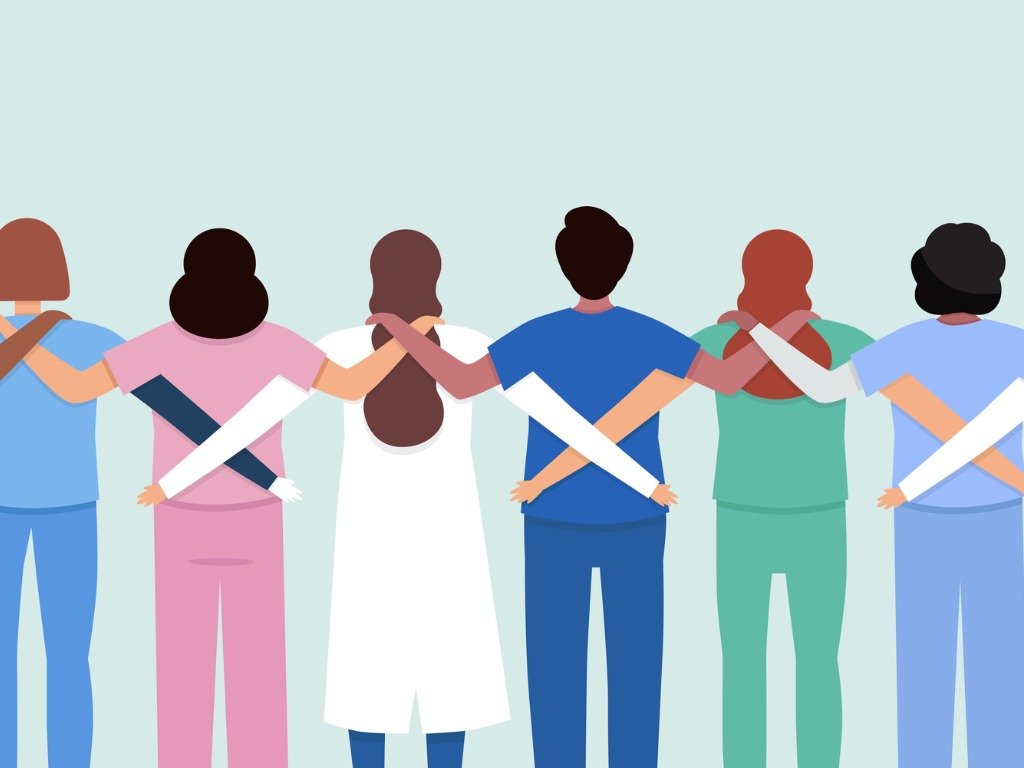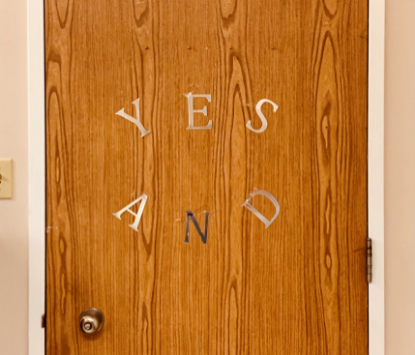Harnessing the Power of Improv During Uncertain Times

As clinicians, we value guidelines and algorithms. They provide us with reassurance that our decisions are based on expert opinion and scientific evidence. However, more often than not, we find ourselves in clinical encounters working within uncertainty.
Within our respective palliative care teams, we have found guidance, comfort, and counsel in navigating the uncertainty of this pandemic in a seemingly unexpected way. That is, by folding teachings from improvisational theatre (“improv”) into our clinical care and our support for each other and ourselves. If unfamiliar, improv is a form of performance created collaboratively, in present time, without prior rehearsal or use of an established script. It requires collaboration between the actors on stage with trust, listening, and partnership as essential to the process.
Improv and Palliative Care: Am I Hearing this Right?
You may be asking yourselves what this has to do with palliative care, and why we take comfort in this approach.
Although a seemingly unexpected pairing, the tenets of improv, as shown through examples below, apply effectively to palliative care practice. We have described the educational approach of teaching improv skills to support and strengthen palliative practice as “Narrative Improv: Care in Relationship.” This teaching recognizes that clinicians must have the mental and emotional agility to listen and respond in the moment; to think creatively and collaboratively; and to work within trusted partnerships. We have found that the deliberate practice and purposeful application of an improv mindset during complex, evolving, and difficult times can reinspire clinicians toward our inherent ability to listen attentively, respond authentically, and develop partnerships with patients and colleagues. In the midst of uncertainty, this art form has reminded us of the ability we have within us and the potential we have between us.
"[Adopting] an improv mindset during complex, evolving, and difficult times can reinspire clinicians toward our inherent ability to listen attentively, respond authentically, and develop partnerships with patients and colleagues."
In the early days of the coronavirus pandemic, our team exchanged stories of what we were seeing clinically and borrowed a metaphor from improv: “flying the plane while building it at the same time.” As a health care community, we have faced challenges in ethical and equitable resource allocation. We have had to publicly admit and privately struggle with the uncertainty inherent in unfolding scientific discovery, as we await prevention, management, and treatment regimens. We have been forced to re-envision the way we provide care to patients, the ways in which we connect with patients and families, and our ability to provide comfort.
Additionally, we face the continued unveiling of the disparities, racism, and injustice embedded in our health system. As we consider how to move forward while recognizing our collective and individual grief, we remember that these stressors are occurring on a foundation that was already crumbling under the prevalence of compassion fatigue and burnout among health professionals.
"Improv serves as a model for 'thinking outside of the box' and encourages listening and collaboration across disciplines and specialties."
Using the tools and principles of improv can help us cope with these challenges. It is another way to encourage colleagues within the field of palliative medicine—and those without subspeciality training—to come together in a new form of learning about complex communication, connection, and partnership. Improv serves as a model for “thinking outside of the box” and encourages listening and collaboration across disciplines and specialties. Improv serves as a non-traditional way of fostering relationships and can help improve partnerships across a variety of settings.
Building Connections and Inviting Curiosity
In applying the tenets of improv, we are learning that the response to uncertainty in medicine must be grounded in partnership, connection, and humility. The tenets of improv, described in more detail below, include concepts of collaboration through “Yes, and”, and looking for and accepting the gifts that are given. Improv, like palliative practice, requires participants to be in the moment, remain flexible to the input of our partner (i.e., patient and family), and exhibit vulnerability and bravery in following our intuition.
"In applying the tenets of improv, we are learning that the response to uncertainty in medicine must be grounded in partnership, connection, and humility."
Bear in mind that the foundation of improv is not about being funny. It's actually about being extraordinarily ourselves. The root of improv is similar to the root of palliative care—creating safe and supportive partnerships in new and unfolding spaces. We're taking the seeds of the same roots to educate in a different way about communication, implicit bias, and collaboration.
Yes, and…
“Yes, and…” is a widely recognized tenet of improv by which actors accept each other’s ideas with a tacit agreement to build the scene collectively. The “Yes” allows for the receiver to accept their partner’s offering, and the “and” encompasses a commitment to build the narrative within the partnership. In medicine, we have found “Yes, and” to be embodied in shared decision-making, where the practitioner invites the perspectives of patients and families, and incorporates this knowledge into an individualized medical recommendation based on the patient’s and caregiver’s values.
Being able to practice “Yes, and…” is contingent upon cultivating awareness of self and other within a relationship. It means the clinician recognizes the limits of individual perspective and biases while accepting the patient’s expertise about their own body, values, and goals of care. Adopting a mindset humble to the expertise of patients and families may offer us a means by which to mitigate unconscious bias—especially when caring for populations who have disproportionately suffered as a result of structural racism and disenfranchisement.
In applying “Yes, and,” practitioners and patients bear witness together to the suffering caused by disease, a failed medical treatment, or a pandemic, and find solace in knowing we are not alone in our hopes, worries, and fears. In this connection and with this intention, we may then be able to continue to care and communicate in a way that is imbued with honesty, understanding, and compassion.

Receiving “Gifts”
A common improv exercise is “Giving Gifts,” which is when improv partners surprise one another with new and unexpected proposals through which to continue to build the scene.
We have discovered that physical distancing has allowed for new ways to connect with patients and families that offer greater insights into their lives. As described by a parent of a child with medical complexity on a telehealth visit from her home, “Usually you see me with my makeup, best outfit, and scheduling my whole day around the two-hour drive to get to your clinic. You are now seeing the real deal. All the noise, all the other kids, grandparents, the nurse, and everyone inserting their opinions of how we together care for [the patient].” Although separated by a computer screen, patients and their families have been able to share the full dimensionality of their lives, which has been a particularly poignant gift during a time that filled with isolation, strain, and loss.
Building the Plane Together
Improv teaches us that each person within a scene is essential when co-creating the narrative. As we have witnessed throughout the pandemic, not only is teamwork necessary to coordinate the logistics of delivering care, the camaraderie and emotional support that health care workers provide one another are equally as important, especially as mental health needs among health care workers are exacerbated with the added trauma of this crisis.
"Improv teaches us that each person within a scene is essential when co-creating the narrative."
It is difficult to provide care alongside extraordinary uncertainty. We may wonder if someone smarter, more hardworking, or with some unmeasurable ability greater than our own would have been able to do better. The tenets of improv remind us that we have within us the very best that we can offer, even when we are unable to “fix” a problem. By recognizing our self-worth, the inherent uncertainty in our practice and in life, and by inviting each participant to bring their most authentic selves to the scene with generosity; we will still be “flying the plane while building it at the same time”, while perhaps finding healing in doing it, together.
Applying Improv to Your Practice
While our improv work is localized right now, we are working on expanding training on a national level. Meanwhile, you can get involved by taking community improvisation classes with appropriate pandemic precautions. You may also review the education key takeaways presentation from our trainings, which includes background, exercises, and more. Additionally, you can reach out to us for suggestions on incorporating this approach into your own practice.
Some strategies you can use now include:
- Recognizing “I am enough” and “I am not alone”. You are in partnership with the people you work with—the patient, family, clinicians, and team members.
- As patients and families offer their stories and perspectives, employ the “yes, and” technique, allowing further opportunities to come to a place of healing.
- Be open to unexpected “gifts”, building upon partnerships to create new systems of care. Be open to each encounter anew, with an open mind and open heart.
- Create space for partnership in ensuring that colleagues, patients, and families are able to contribute meaningfully towards building the scene together.

Be the first to read articles from the field (and beyond), access new resources, and register for upcoming events.
Edited by Melissa Baron. Clinical review by Andrew Esch, MD, MBA.


